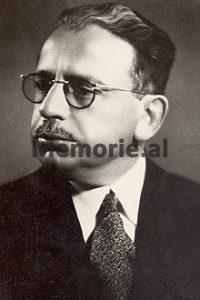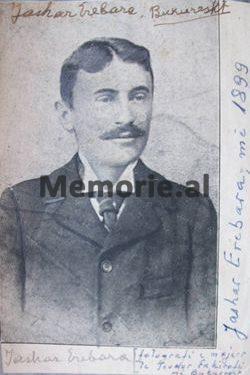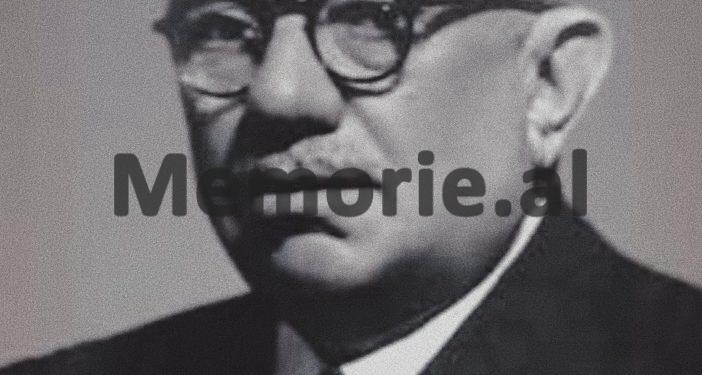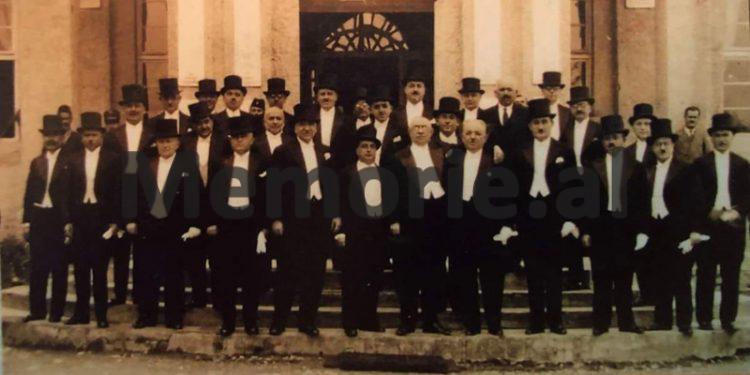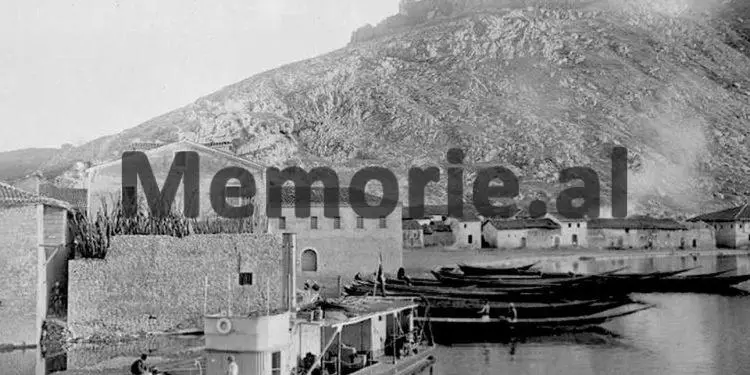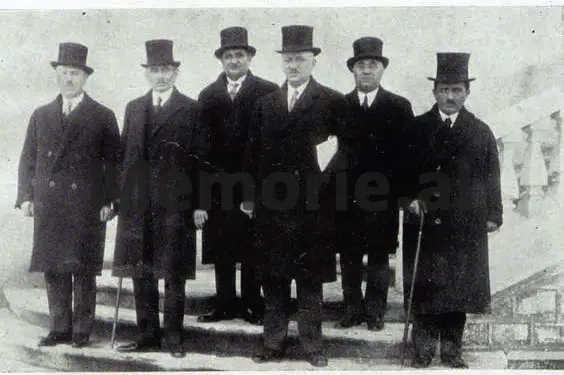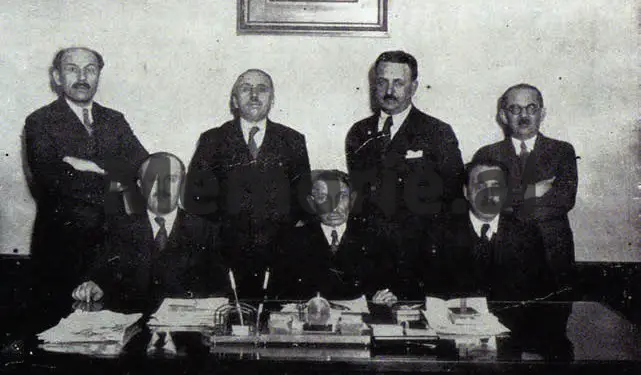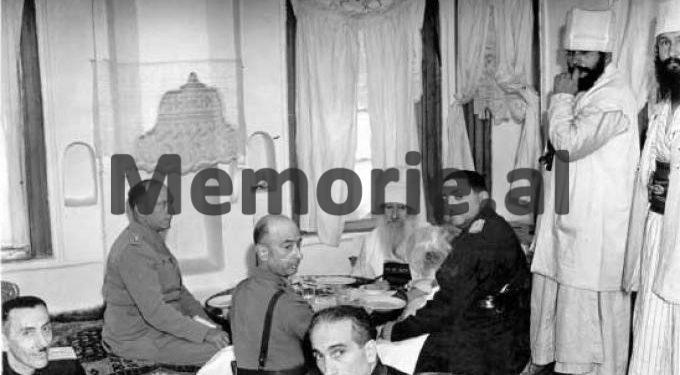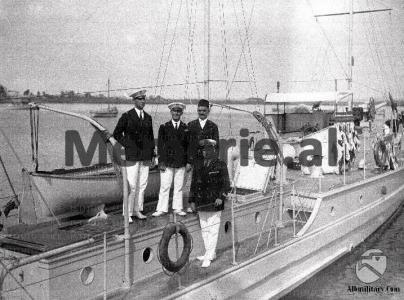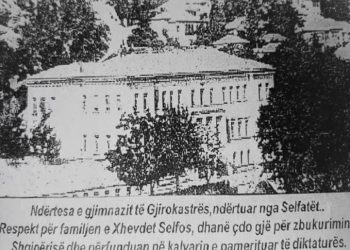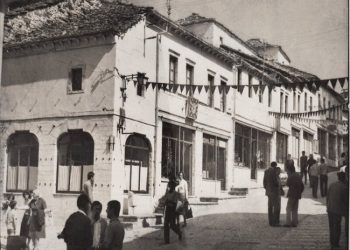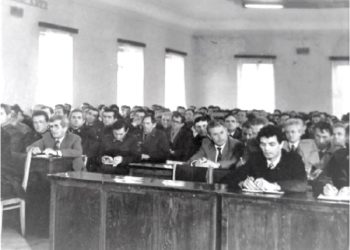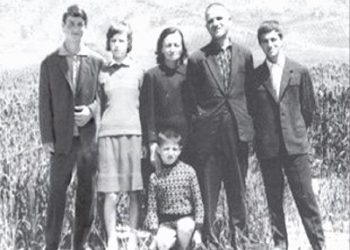Dashnor Kaloçi
Memorie.al publishes the unknown history of the debates that took place in the Albanian parliament of the period of the Zog Monarchy, at the end of 1937 and the beginning of ’38, when a group of deputies summoned to interpellation, the Minister of National Economy, Terenc Toçi , asking him to give explanations regarding the complaints of a group of traders, who accused the government, that it did favors and selectivity among traders in customs. How were all the debates in the parliament of that time covered by the newspapers “Drita” and “Arbnia” regarding the accusations against Minister Toçi and his explanations, regarding the firm “Bakalli”, etc.
Clashes and fierce conflicts that have recently arisen between traders and various business groups with the government, which are mostly related to taxes, duties, customs, government controls over private entities, as well as the drafting of the relevant legislation for the normal functioning of these businesses, are not a previously unknown and unheard-of phenomenon. Their origin has its source with the creation of the first independent Albanian state in November 1912, even much earlier, since the time of Turkey, when our country was under the Ottoman Empire and the country’s economy operated on the basis of that legislation like all other areas of that empire. But clashes and conflicts between different business groups and governments have occurred mostly during the years of the Zog Monarchy, when the economy of the Albanian state operated on the basis of modern legislation that left nothing lacking even to the most advanced and most advanced states. developed of the West. Among other things, this is confirmed by the numerous debates that took place at that time in the Albanian Parliament, where from time to time the Ministers of National Economy were called to interpellations by various MPs, to give explanations regarding the numerous complaints that came to the address of Parliament by merchants or various business groups of that time. One of these ‘government-business’ clashes is that of the end of 1937 and the beginning of 1938, when some deputies of the Albanian Parliament summoned the then Minister of National Economy, Terenc Toçi, accusing him of selectively distributing permits. giving information to various traders seeking to import goods from abroad and asking him for explanations of how he had distributed those permits.
Great interest of journalists for the interpellation in the Parliament
As it is known from the press of that time, the parliamentary session where the Minister of Economy, Terenc Toçi, was called to the interpellation, had aroused an extraordinary interest, which seemed in the large participation of journalists in the lodges of that Parliament and the guests. others who were there. Regarding this, among others, the newspaper “Drita”, dated January 13, 1938, wrote, among other things: “Yesterday the Parliament had as a framework, in its talks, a large number of listeners of each category. From three o’clock. In the afternoon, the lodges were filled to the brim with journalists, high-ranking officials and merchants who had come to Tirana from different parts of Albania, in fact, the talks focused yesterday on the question that some deputies had addressed to the Minister of Economy some time ago. Amid a deep silence, the session was opened by the Speaker of the Parliament, Mr. Pandeli Evangjeli, and the conversation started in a hot atmosphere that held the attention of the National Assembly. all listeners “.
MP Erebara accuses the Ministry of Economy
After the article, the journalist of the daily “Drita”, who followed the proceedings of that parliamentary session, in his exhibition reflected the main item on the agenda, the interpellation with the Minister of National Economy, Terenc Toçi. In this regard, he writes: “After announcing the draft law on the works of the pier of Durrës (Port, our note) and after granting five weeks leave to Mr. Xh. Leskovik, for health reasons, enters the agenda, starting with the explanation from the Minister of National Economy, on the question of what measures he intends to take for the goods of the traders to remain in the State Customs and the discussion on the report of the Prayer Commission on the prayer of some traders of Durrës. the questioner, who says that his question was outdated, since two months had passed.If they had been mameluks, still as humans we should have been given an answer.At that time we had heard traders complaining about why they were not allowed to take their goods out of customs even though they had paid them and were in line with the taxes required by the trade regulation. Someone came here and told us that someone was given permission and someone was not. We know that here n we are all the same. We need to know that, not only are we on the edge of the Adriatic, but also in the middle of Europe and therefore no distinction should be made.
The Minister of National Economy, Mr. Terenc Toçi, responds by saying that he wants to know who received the goods and who did not, and that all actions were done in accordance with laws and regulations. We are an institutional state and we must always respect the laws and regulations. The report of the Commission of Prayers on the prayer of some traders of Durrës is being discussed “.
MP Erebara: The Ministry makes distinctions between traders
After the first questions addressed to the Minister of Economy, Terenc Toçi, and his short answer, in his exposition, the journalist of “Drita” writes: “Mr. Jashar Erebara says that all the points are explained in the report and that he will He says that in the interest of the National Economy, as if the goods were brought to the Durrës Customs even outside the rules, a way had to be found, but as he is saying here, our Ministry has become an Obert-commando (General Command, a German term used since the time of Austro-Hungary, our note), who gives permission to whom he wants and to whom he does not want. Mr. Fejzi Alizoti, says that his colleague and the Prayer Commission have summoned the Minister of National Economy for questioning on some irregularities, since we will also receive from the answer of the Minister we know here, must j that the commission, together with this report, had attached the answer given to the Commission by the Minister, in order for us to form a complete idea of how the truth stands. Explains that even for the normalization and regulation of trade, the Government was authorized to make a regulation and did so which is in force. A firm, Bakalli, not being registered in the Chamber of Commerce list as an importer (importer of goods), has brought a quantity of goods out of the quality of its trade. And the minister has given him permission. This permission – asked Mr. Alizoti, did the Minister give it as compensation or as a premium? It seeks to clarify the issue to form a complete idea of who is wrong, the government or the traders who are complaining. ”
MP Mihal Kaso: To form a parliamentary commission
After the accusations made in Parliament against the Minister of Economy, Toçi, by the deputies Jashar Erebara and Fejzi Alizoti, the other deputy Mihal Kaso took the floor, about whom the journalist of “Drita” writes, among other things: “Mr. Mihal Kaso starts It was emphasized that the talks were of great and special importance because they belonged to the National Economy of the State, after a detailed review of the various articles of the foreign trade regulation in accordance with the complaints of the traders of Durrës and Tirana, enters on the merit of the case and says: Although both the traders of Durrës and the regions have notified the Ministry of National Economy on 14 August, saying what goods are in the Customs warehouses and the goods on the trip, still the competent Ministry some released them without 10% and some with 10%, while some others he did not release at all.
They complained that the Ministry of National Economy, with the circular dated 18.IX.1937, and the telegram dated 1 October, violating the provisions of the trade regulation, ordered that, in order to order the interested parties for the goods, it is sufficient to submit the request. But, after a few days, with another telegram, he canceled the first circular, although the traders acted from August 13 to November 5 in accordance with the legal provisions and the orders of the Minister. On November 5, 1937, the Ministry of Economy sent this telegram to the Chambers of Commerce: ‘Notify me that the permits requested so far are under negotiation. Stop. New import permits are not issued until further notice. Stop the goods that will come after today are not released ‘. Bringing many other analogous arguments, he concludes by saying that the various orders of the Ministry of National Economy, given man after father and in open contradiction with the provisions in force, have brought a great deal of confusion and put traders in positions very difficult, remaining goods through Customs, having been ordered in conformity with the provisions of the regulation and with the orders of the Minister, orders which were then canceled by other circulars. It therefore requires the formation of a commission to investigate the matter. Mr. Rexhep Jella, responding to the Minister who asked to know the names of the traders, gives the example of Mr. Dovana in Durrës and Mr. Konçi, a trader in Tirana, who asked for permission and it was not given to them “.
Minister Toçi’s explanations for the firm “Bakalli”
After the direct accusations addressed to the Minister of Economy, Mr. Toçi responded by giving his explanations on the problem. In this regard, among other things, the newspaper “Drita” writes: “The Minister of National Economy shows the rejection that attached to the report of the Commission has not been copied and the answer given by the Ministry of National Economy to the Prayer Commission. Responding to Mr. Kaso, says that his master is a good lawyer, and that he does not believe that he can protect the ‘sentimental sarafans’, because such are – says the Minister – these traders who, the next day when the announcement of conditionality for imports from several countries came out at once They increase the price of goods in their warehouses by 40% and are able to prove this with invoices, adding that this addition was made at the expense of the poor who consumed these goods. Article 16 of the import regulations shows, says the Minister, the procedure for obtaining an import permit and Article 18 stipulates that the competent Ministry has the right to grant a permit and to refuse to never have a full convection. we refused permission not that the action was within the regulation, but only at the mercy of the Economy
National to protect the national capital that previously the goods were imported and then the permit application was made.
The Minister of Economy is starting to respond to all the remarks made by the parliamentary committee in his report. Regarding the mention of the firm ‘Bakalli’, he says that the law does not differentiate between exporters (exporting firms), and importers (importing firms), i.e. there is no trade difference, and the permit was granted in accordance with Article 5, paragraph a) of the Regulation, which paragraph states: ‘When the importer proves to have exported Albanian products after the date of publication of this Regulation in the State from which he wants to import goods for 50% of the value of this goods’.
As for what is said that Mr. Bakalli has ceded the permit among other traders, this is why Mr. MP has sentimentally studied the regulation that Mr. Bakalli has this right because here is what article 7 says: ‘Compensation provided by article 5 can be performed by different traders ie. to allow the import of goods to enter even when the export of the relevant national products and to be carried out by another trader, but always with the permission of the latter and on the basis of proof customs documents ‘.
So Bakalli had the right to cede the right of export. Regarding the point in question about Mr. Vlash Dovana, he says that the purpose of the regulation is to support the exporter to reduce imports from countries that do not import from Albania. Mr. Dovana has imported 60 thousand fr. From these countries. gold to a greater extent than ever before, we also gave permission to this one, not for another purpose, but because we were afraid that the national economy and the Albanian capital would not be damaged, that his master was not within the regulation, he made it ‘fait a comli ‘(fact committed), that he first brought the goods from abroad and then asked for permission. With regard to point 4), paragraph a), of the report of the Commission regarding the firm ‘Bakalli’, the Commission did not sing with remarks Article 5 of the Regulation, which reads literally as follows:
a) When the importer proves that he has exported Albanian products after the date of promulgation of this regulation in the country from which he wants to import goods, for 50% of these goods he is given a permit. He says after the date of publication of the regulation, emphasizes the Minister, and not after the decision of the Ministerial Council. The regulation entered into force on April 25, 1936. The firm Bakalli, continues Mr. Minister, which is an honest firm, deserves to be thanked and not accused. “This firm, not with sentimental saraphs (privileges due to friendships, our note), but with bank documents, has proved that it has exported to Switzerland a considerable amount of Albanian goods”.
Minister Toçi: We have shortcomings
After the explanations made in the parliamentary session regarding the accusations made against him, the Minister of Economy, Mr. Terenc Toçi, in his speech continued again with other explanations, interpreting the relevant legislation on import-export, for which in the newspaper “Drita”, among other things it is written: “Mr. Dovana has requested permission for import of goods and presented some documents , he was given the permit and he overcame it and he wanted to go as valid the documents of the order and not the transport. My Minister concludes, which invalidates the arguments of the Prayer Commission. It may be wrong or why he did not like or did not reprimand the regulation or was influenced by various propaganda. I assure the honest Parliament that every action of the Ministry of Economy is based on the high interest of the State, not on the interest of one or the other, and is not influenced by anyone’s propaganda and does not hold anyone’s bag.
Mr. Mihal Kaso rejects the allegation made by the Minister of Propaganda and says that the Minister did not respond to his remarks. It will not be possible to find out who has the right before the commission is formed to investigate this issue.
Mr. Lame Kareco points out some shortcomings of the regulation which he develops one by one and recommends to the Minister to consider modifying them. The Minister acknowledges the shortcomings that the regulation may have, but says that these have been foreseen by the Government and he will soon present a draft law. The discussion on this issue ends and the decree-law on roads is accepted, for the last time, as well as the draft-law on the acceptance of the convention on Extradition and Judicial Assistance in Albanian-Czechoslovak criminal cases, issued by the Commission. “Talks on the decree-law on the establishment of the Directorate of Emigrants at the Ministry of Internal Affairs, also due to the absence of the Minister of Justice, the discussion of laws pertaining to Justice was updated.”
Mutual accusations of traders and the Customs Directorate!
The conflict between various Albanian traders dealing with the import-export of goods and the Ministry of National Economy, a conflict which was exacerbated during the period of the Zog Monarchy, or more precisely at the end of 1937 and the beginning of ’38, by caused the issue to go to Parliament, where a group of MPs called on the interpellation to give explanations to Minister Terenc Toçi, is not an unheard of and unknown phenomenon in the relations between traders and various governments that have run this country since its inception of the Albanian state in November 1912.
History / In his memoirs, Prince Wied accused the head of the Durrës government: “Even Esat Pasha abused the Durrës Customs”
Since the creation of the first Albanian state on November 28, 1912, when after the Declaration of Independence of Albania by the elder of Vlora, Ismail Qemali, the first government cabinet was formed headed by him, until today, with the exception of the communist governments of 1944-91, almost all other government cabinets, especially those of the post-communist years, have been accused of “encroaching on state customs”. One of them was Esat Pasha, the head of the government of Durrës in 1914, who has long been rumored about his abuses with the Durrës Customs. One of those who accused the Pasha of Tirana of this was Prince Wied, who in his memoirs published in Germany a few years after leaving Albania, wrote, among other things: “Unlike Prime Minister Ismail Qemali, who used the revenues from the Vlora Customs to strengthen and arm the Gendarmerie, or to keep the Albanian Muhajirs who came to the olive groves of Vlora after the massacres of the Greeks in the southern provinces of Albania, , the revenues from the Durrës Customs he used all for his pocket “./ Memorie.al




